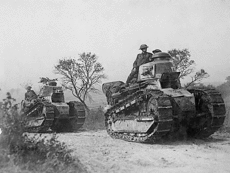
Renault FT tanks being operated by the US Army in France, 1918.
There are many factors that contributed to the outbreak of World War One. New ideologies of imperialism, nationalism and capitalism played a role, as did military and economic competition among European powers. Diplomats and political leaders were often ill-equipped for their roles, and more focused on power and prestige than peace and prosperity. The system of political alliances had unforeseen ramifications. In this learning pathway, you will explore how all these factors combined to lead to the outbreak of war.
During this learning pathway you will watch one video lecture, and complete several readings.
- Examine the causes of World War One
- Explore how competition among the major powers and alliances between them contributed to the outbreak of war
- Learn how the assassination of Archduke Franz Ferdinand of Austria-Hungary ultimately sparked the war
There are many factors that contributed to the outbreak of World War One. New ideologies of imperialism, nationalism and capitalism played a role, as did military and economic competition among European powers. Diplomats and political leaders were often ill-equipped for their roles, and more focused on power and prestige than peace and prosperity. The system of political alliances had unforeseen ramifications. In this learning pathway, you will explore how all these factors combined to lead to the outbreak of war.
During this learning pathway you will watch one video lecture, and complete several readings.
Objectives
Content is available under the
Creative Commons Attribution Share Alike License.
Privacy Policy | Authors